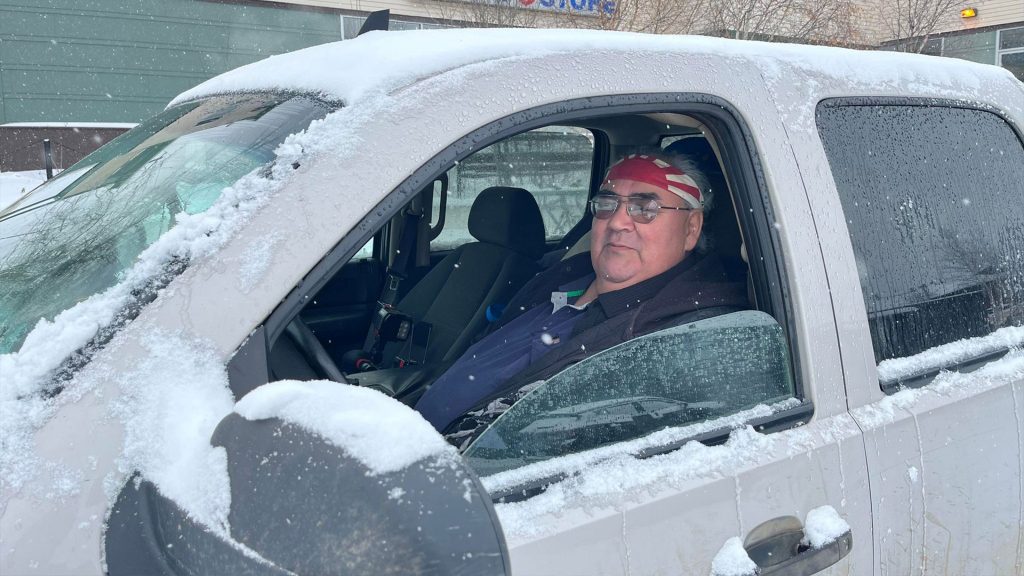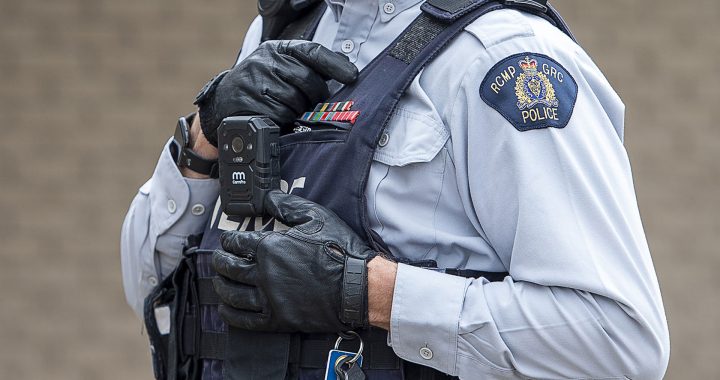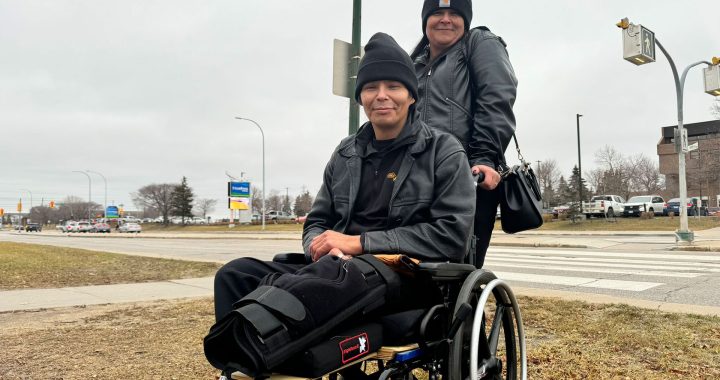
Fraser Trennert is parked outside of Bailey House Transitional Housing in Yellowknife. He's a former client who was been sleeping in his truck due to a lack of housing options. Photo: Charlotte Morritt-Jacobs/APTN.
For four years Fraser Trennert was living in Baily House, the Salvation Army’s 32-bed transitional housing program in Yellowknife. Now his only shelter is his truck.
“They are under no obligation to help you find accommodation,” Trennert said. “To move you on to a better situation, but I am 62 years plus with a few medical issues, osteoarthritis, CPAP machine [a device to keep airwaves open during sleep], diabetic medicine and I haven’t used any of them for over a week now.”
Trennert is a residential school survivor from the Beaufort Delta.
He receives a monthly disability payment of $830, however, the money he receives from his share of the Inuvialuit Final Settlement agreement is considered income and is clawed back from his payment.
Despite this, he was able to manage to front $1,115 per month rent to live at Bailey House – less than the $2,400 he’d have to pay for an apartment on the open market.
“The government made these land claims, but the territorial government does not want to honour the federal government’s wishes,” Trennert said. “When I am on income support [including disability], every little cheque I get, guess what we owe the government more money.”
Clients at Bailey House can stay in the transitional housing program for up to four years, which includes the initial three-year period and the possibility of two six-month extensions.
Trennert indicated that Bailey House gave him a list of apartments for rent. But he is barred from being able to rent any due to his $1,500 arrears with YK Public Housing. He said he’s not in a position to pay back this debt.
He’s not alone. NWT Housing reported rental arrears of $11.6 million as of March 2023.
Tony Brushett, the Salvation Army’s director in Yellowknife, outlined how the group’s programming extends beyond a traditional landlord-tenant association.
While clients are required to pay rent, they also have the opportunity to participate in intensive case management. This program provides support for a range of needs, including addiction and mental health issues.
“Our staff are directly connected to the landlords who would rent to the vulnerable population,” Brushett said. “In almost every case there would be a few to multiple opportunities for housing before that 3 years is up.”
He mentioned that the Salvation Army imposes a three-year limit for transitional housing clients because of funding limitations. Despite this, the length of this program surpasses other transitional housing programs in southern Canada.
“What happens then is it gets into a legal piece, once you start getting into year four it almost comes down to squatter’s rights where people go on property,” Brushett said. “We could be forced into a landlord type of deal, so we try not to do that because we are funded to try and assist people in moving on.”
The Salvation Army offers both a food bank program and transitional housing, which helps 40 to 50 families or around 140 people.
Being the only overnight shelter for men in the city, they open their doors to more than 100 people every night. At daybreak, the clients are sent on their way, often to roam downtown or head to the day shelter.
This fall, there has been an increase in clients seeking shelter.
“When folks were down south they met up with some relatives who said hey you should come north with us, it is easier up here than the big cities, so we have seen a noticeable increase in new faces using our shelters and other programs,” he said.
The occupancy rate of the shelter has been soaring recently, reaching 140 per cent and extra cots have been brought in to accommodate the overflow.
“They come in at seven at night and are gone by seven in the morning and do what they do all day with no programming.,” Brushett said. “When they come back again at 7 p.m. tonight, most have had a bad day, and we will warehouse all of them together.”

James Picard has been taking refuge in the laundry rooms of multiple apartment complexes in town.
“I see a lot of people sleeping in the banks right there they have nowhere else to go,” Picard tearfully said. “I am a little more resourceful and no one seen me. I even poked a hole in one of the laundry hoses, so I could drink some water and take my medication.”
Originally from Saskatchewan, but living in the north since the early 2000s, he’s on long-term disability from a traumatic brain injury and can’t afford the $2,400 rent for a one-bedroom apartment in Yellowknife
He said he was a client of the Bailey House for six weeks, but during the wildfire evacuations, the needs of clients were overlooked.
“There was no heat in the rooms, it was -1 in some of the rooms and I had to take a toaster from the common area. I ripped the sides off of it,” Picard said. “I didn’t feel like the workers were trained in mental health and with my brain injury I have outbursts, so I left.
Picard remarked how 2023 has been particularly difficult for him, mainly as a result of his injury which has hindered him from working.
“I’m in a position where I don’t want to wake up, I wish I could just get drunk and fall back asleep, I don’t like where I am,” he said.
After his departure from the Bailey House, he spent a short time in the Salvation Army refuge. Even that was short-lived as he made up his mind to leave due to concerns about his safety, as certain individuals at the shelter can be volatile.
“It is a very, very unsafe place,” Picard said pulling out his phone to show a video he recorded of a man threatening to kill everyone and bomb the shelter. “He came at me with what seemed to be a pair of scissors or long needle nose pliers making stabbing motions.”
According to public data from the Yellowknife wildfire evacuation in August 2023, there are more than 300 homeless people in the city.
Trennet was familiar with Picard’s story.
“Bailey house uses fear and oppression to keep your mouth shut and if you don’t obey you are evicted,” Trennet said.
Meanwhile, he doesn’t know how long he can stay in his truck for.
“My eating habits and my sleep, everything changed and deteriorated,” Trennet said. “I started to go back to my old lifestyle under so much stress and pressure that I started caving into my old habits of drugs and alcohol.”









